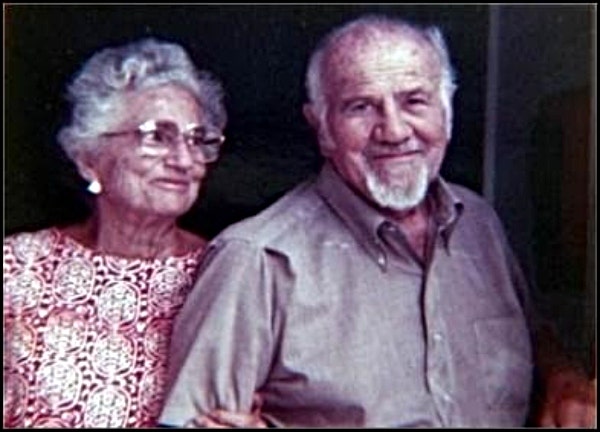Father’s Day: From Routine Obligation Or Happy Occasion, To Fresh Opportunity For You
Open a wide door to your thoughts and emotions.
 Getty
Getty Relationships with a father can call up a range of associations and meanings.
Maybe you feel resentment, indifference, or loss. Perhaps predictable and habitual memories and images emerge.
For some, emotions include joy and deep love, yearning, and regret.
Given your complexity and his, what you feel about your father may be a mix of several aspects, assuming he is known and present in your life, which is not the case for many people.
Well, my father is no longer available in person. The final, formal goodbye I had was at his celebration of life outside, where a mockingbird sang on the fence during the appreciations and prayers.
Toward the end, I heard something like his voice say, "Don’t worry."

When I decided to write about Abraham Lincoln Schimel for Father’s Day, a flood of ideas and images came to mind ─ different from the quickly passing associations that float by during the year and on other Father’s Days.
I hope this article will encourage you to write about what your father means to you or directly to him, if you wish.
I've found that writing provides a way of bringing up and sustaining his presence. It may also stimulate additional insights about your relationship with your father and his influence on you.
Another benefit is reconnecting with him through the bridges of memories — habitual and new ones — as you permit a stream of consciousness.
Alternatively, writing may offer a catharsis.
When one of my clients spoke about unfinished business with her father that seemed to haunt her, I suggested writing him a letter — she could choose to send it or not. She did mail it after satisfying herself that it was honest and kind.
Later, she told me that he died unexpectedly about three months after he received the letter, and how relieved she was that it had led to a too-often postponed conversation.
On the other hand, maybe you’d prefer to let your father "be in peace," whether he's alive or not. Not every father is memorable, and relationships can be fraught.
Whatever your feelings, may this article open new or deeper ways to consider your father to benefit yourself and possibly him.
Ways to transcend old tendencies.
I don’t think my father knew how to relate to me as I was growing up.
An engineer and teacher of teenage boys, I didn't fit into his traditional idea of what a girl should be ─ at least, until he saw me in action as an adult in a range of situations.
By keeping my parents informed of my adventures and activities, they grew to understand me better as an adult.
As a kid, I remember Pop admonishing me not to talk loudly on the phone. "If you don’t have anything nice to say, don’t say it at all," was another line.
In a different context than our small apartment, where he probably felt constrained, he taught me how to shoot a rifle when I was around 10.
I remember clearly how he showed me how to make a kite using thin strips of wood, string, newspaper, small pieces of rags for the tail, and paste we made from flour and water.
He was probably more at ease teaching and guiding than connecting with a noisy, assertive girl.
I don’t think I really got to know him until we were both much older and I became interested in understanding him. By then, I had organized family photos, including those from his teen years to his 80s.
I was intrigued by his range of roles ─ how his appearance morphed from the confident, sharply dressed 18-year-old car lover to the unsmiling young father and committed wage earner.
Freed of those traditional male roles in later life, he seemed more relaxed and accessible to who he really was: the curious, kind learner who still enjoyed explaining and questioning things while being sociable with gentle humor and encouragement.
The more inspiring and open opportunities for getting to know one another better came together as we talked one-on-one in private, freed from family routines.
One time, I asked him what he thought about women’s capabilities, knowing his chauvinist tendencies.
His answer was full of limiting stereotypes. So, I had a little fun rather than arguing with him.
I asked if he believed that, what about Mom and me? He said, "You’re different." A good and reasonable choice, given my and my mother’s independence and originality.
Much of who I am, in fact, reflects his values about learning and being useful to others.
Another time, his playful humor came through when I asked him about his religious beliefs. He thought all religions were similar in their stress on the golden rule.
Since I knew he also believed in reincarnation, I asked him how that "fit" with his attitudes about God or a higher power. With a twinkle in his eye, he said, "I can’t believe I learned all this for nothing."
What are your takeaways to benefit your relationship with your father?
Consider and adapt the following 3 questions.
1. What are your communication and connection patterns?
Think about how you communicate with your father, now or previously.
How would you describe habits of conversation, whether it's discussing your day, sharing ideas, emotions, and impressions, reporting on concerns and accomplishments, or avoiding such openness?
For example:
- Do you start your questions with "what" and "how"?
- Who initiates talk and activities?
- When do you get together? Are they obligatory visits, family social occasions, or spontaneous and fun situations?
2. How is humor used?
There's a difference between what I think is funny and what some men say.
To me, their humor can be teasing or competitive ripostes, rather than exchanges that are actual conversations.
Whatever characterizes your communication with your father, ask yourself how you each could benefit from departing from what’s predictable and routine in favor of something more enjoyable, exploratory, or fresh.
3. How well do you really know one another?
Are you alert to cues that transcend what you expect from your father?
To depart from comfortable or unquestioned habits that repeat during conventional situations, maybe go through some photos together. With or without the photos as props, ask him to comment on his past.
What does he remember about school and his plans for the future at that time? How did he meet your mother? What disappointments or challenges did he face?
Try out whatever comes to mind that’s appropriate. But don’t just ply him with questions.
Expand the talk to sharing memories and impressions, expressing emotions, attitudes, and interests. You may even explore new opportunities, hopes, and expectations for the relationship.
There are other ways way to move forward and improve your relationship with your father, if you wish.
You can move from automatic pilot and judgment to empathizing. If you have trouble imagining yourself in your father’s shoes, learn something about the economic, political, and social situations in which he grew up.
Imagine how you would have evolved under similar circumstances. How has his life experience and behavior influenced your interests, values, and goals ─ directly, in opposition, or in contrast?
A friend of mine offered this definition of being an adult: being able to forgive your parents and recognize your own faults and foibles.
I would add taking what’s useful and inspiring from what you learned from your father or a father figure and leaving the rest.
Start small and have reasonable expectations.
Freshen up this Father’s Day by trying some new behaviors and activities that are low key. Maybe revisit worthwhile memories for learning, insights, and fun.
What one or two steps will you take now to move from memories to action, from nostalgia and known limitations to encouraging experimenting with different possibilities and pleasures that appeal to you both?
Or, if your father is no longer with you, choose one memory or image to enjoy and one to let go.
As you wish, explore creating a family by choice or appreciate the good luck of having more than one father who has meaning for you.
Ruth Schimel, Ph.D., is a career and life management consultant and author of the Choose Courage series on Amazon. Obtain the bonus first chapter of the upcoming, Happiness and Joy in Work: Preparing for Your Future on her website, where you’ll also find your invitation for a free consultation

